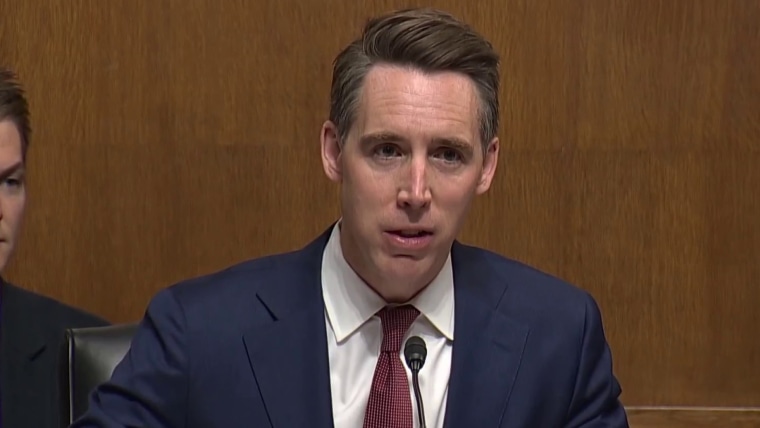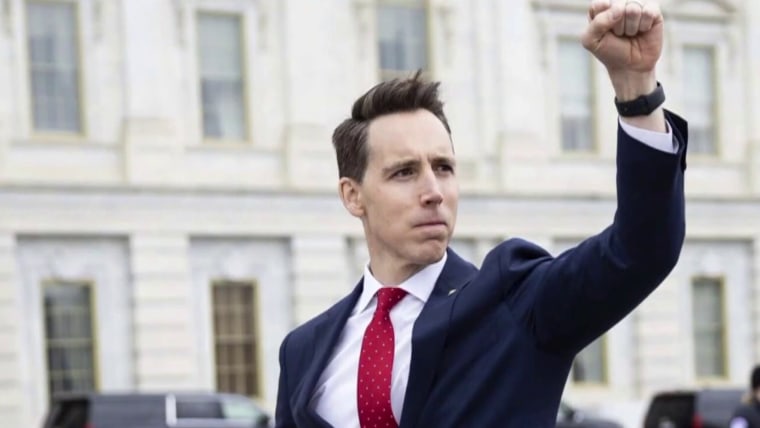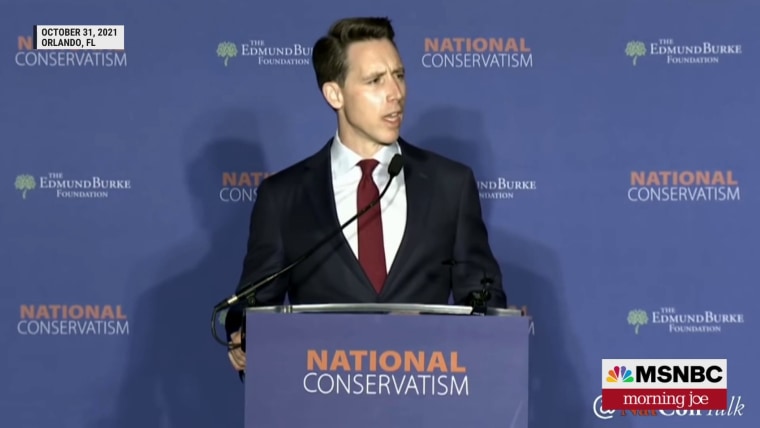When Missouri Sen. Josh Hawley falsely attributed a quote to Founding Father Patrick Henry over the 4th of July holiday weekend, perhaps it shouldn’t have been all that surprising that the quote turned out to be from a white nationalist publication report printed in 1958. Hawley’s recently released book, “Manhood: The Masculine Virtues America Needs,” provides a thorough roadmap to how the senator thinks about his brand of hyperconservative Christian, largely white masculinity and what he perceives as its crisis.
In his book, Hawley argues that men’s feminization is harming our nation. Good and healthy men, he asserts, are naturally imbued with essential qualities that enable them to fulfill their personal, social and political roles. These qualities and the roles they promote — provider and protector, in the service of others — fulfill individual men and give men as a group their critical purpose.
Hawley’s thesis on masculinity draws conclusions that, especially in light of the current crisis of masculinity among young American men, have the potential to be especially harmful to men as individuals and to us as a society.
A recent study conducted by Equimundo Center for Masculinities and Social Justice indicates that Hawley’s onto something and identifies the important connection between manhood and a sense of purpose. While boys and men in America are diffusely struggling to understand masculinity and changing gender roles, the study finds, one cohort of boys and men is not struggling to find meaning: those with the most conservative and traditional beliefs.
This makes sense to a degree, as conventional gender ideology offers rules and principles that are clear and socially rewarded. It also begs the question of whether the notion of “man’s purpose” intrinsically lends itself to these beliefs.
Hawley himself represents this group. He associates manly purpose, for example, with virtues such as strength, mercy, courage, wisdom, justice and humility, which he further associates with Christian manhood and service and patriotism.
But Hawley’s thesis on masculinity draws conclusions that, especially in light of the current crisis of masculinity among young American men, have the potential to be especially harmful to men as individuals and to us as a society.
To date, public conversations about masculinity, Hawley’s book included, have largely focused on how changing norms affect boys and men as individuals and workers. But what about the deeply discriminatory and politically corrosive effects of traditional masculinity ideals?
Conservative gender ideologies such as Hawley’s — rigidly binary, profoundly paternalistic and densely imbricated with white supremacy — carry serious economic, social and political implications.

People, including women, who embrace Hawley’s conventional masculinity are likelier to hold sexist and anti-democratic attitudes. The Equimundo study found, as others have in the past, that those who embrace conventional masculinity are more likely to believe, for example, that women shouldn’t work, that men should have the final say in relationships and that men have the right to control women’s whereabouts. A recent meta-analysis of research confirmed the “positive correlation between traditional masculinities and men’s sexism, limiting women’s personal and professional opportunities.” Similar work has also shown that more traditional gender orientations are related to higher tolerance for sexual harassment and assault as well as homophobia, racism and religious intolerance.
Thus the same rules and clarity that give men, according to Hawley et al, a sense of purpose and meaning are those that rationalize male privileges and power, particularly, given history and culture, for white Christian men.
Take, for example, Hawley’s masculine virtues. “The Roman word for manliness” he intones, “was virtus, which is the ancient ancestor of our word for excellence of character, virtue. One became a man by becoming virtuous, by forming oneself to be what manhood demanded.” For Hawley, this Roman sentiment is coupled with a God-mandated masculine identity. Girls and women, however, are clearly also capable of virtues and of being strong, merciful, courageous, wise, just and humble, regardless of Roman history or Hawley’s religious beliefs.
The key to understanding his argument is in why it’s important to attribute these characteristics and behaviors to men and masculinity: as a way to rationalize the prioritization of men’s wage earning and public leadership and power. Hawley is unabashed in his beliefs in this regard. Men, he repeatedly explains, are “meant to lead.”
Between 2021 and 2022, the percentage of men self-identifying as conservative moved from 35% to 40%.
These gender beliefs perpetuate the notion that men should not only provide for and protect but also preside over women. Disturbingly, this formulation of masculinity, challenged by women’s fights for equality, safety, equity and justice, is in retrenchment among men and, increasingly, among young women of all stripes. The belief of men’s “natural” leadership is still deeply embedded in our society’s gender norms.
According to the Equimudo study, for example, a belief that masculinity means controlling women is also shared by the youngest and most politically progressive men. The national study, which surveyed more than 2,000 men drawn from demographically representative groups, revealed that among 18- to 30-year-olds, 51% of men believe that “if a guy has a girlfriend or wife, he deserves to know where she is all the time.” That rate has seen an increase of five percentage points since 2017. Forty-one percent think “a man should always have the final say about decisions in his relationship or marriage,” compared to 34% in 2017. Attitudes such as these are also strongly correlated with homophobia and transphobia, both of which revolve around deep misogyny. Thirty-six percent of men surveyed, for example, believe that “a gay guy is not a ‘real man’” compared to 29% in 2017.
The crux here is that this isn’t about masculinity — which is complex, creatively expressive and varies enormously across cultures. It’s about perpetuating a gender ideology of male domination. It’s also not only about Josh Hawley or him publishing a book that flatly regurgitates mid-1990s Christian evangelical backlash agendas.

A slew of research in recent years has shown a conservative backsliding in gender equality beliefs in the United States, particularly among younger men. The General Social Survey of Americans, an annual social and cultural trends survey conducted by the University of Chicago annually since 1972, found that people aged 18 to 34 are more conservative than older generations when it comes to parental roles and women’s leadership equality.
Even young men who identify as progressive are skeptical that gender inequality is a problem and are exhibiting gender-regressive attitudes and behaviors. Millennial men are significantly more likely than Gen X or baby boomer men to say that society has already made all the changes needed to create equality in the workplace.
More disturbing yet is the growing gender gap in beliefs about gender and equality. Between 2021 and 2022, the percentage of men self-identifying as conservative moved from 35% to 40%, compared to the 28% to 29% shift in women. In 18- to 24-year-olds, the difference was startling, with 21% of women identifying as conservative versus 30% of men. Even though this rightward turn cuts across racial categories, the entrenched entanglements of white supremacy and patriarchal misogyny make this shift more likely among young white men.
Confused about how to be in the world, many boys and men are turning backward toward harmful characterizations of gender instead of working through the changes and complications necessary to build healthier manhood. Holding gender conservative attitudes provides a bridge between otherwise ideologically separate communities and primes people for extremism.
And more and more young men are engaging with online influencers actively promoting only very thinly (and sometimes not at all) veiled misogyny, homophobia and white supremacy. Gender gaps have long defined our political polarization, and the fact that those gender gaps are growing, not shrinking, should concern everyone.
Both pseudo-intellectuals and violent blunt-force sexists are raking in millions promoting dangerous and anti-egalitarian beliefs online to millions of boys and men. Among the youngest men surveyed by Equimundo, for example, more trust Andrew Tate — a man indicted for rape, human trafficking and creating a criminal enterprise specifically to exploit women (20%) — than President Biden (15%).
Unless consciously addressed, our societal and cultural refusal to hold men to a standard of gender equality becomes wrapped into their identities and relationships.
Hawley’s book erases the harms of building men’s identities around women’s socially and politically constructed vulnerabilities, dependence and inequality. For a man to be a provider means women can’t, don’t or shouldn’t provide for themselves; for women to need protecting means they exist in a state of vulnerability. What does manhood look like if women have economic equality and a society that is safer for them?
Misogyny — which feeds racism, homophobia, transphobia and a punishing tolerance for violence — is the basic scaffolding of authoritarianism.
While masculinity, and even boy’s and men’s vulnerability to “extreme male gospel,” have been drawing more attention in media, the fundamental authoritarianism of traditional gender norms and patriarchal masculine fantasies rarely gets the attention it deserves. Misogyny — which feeds racism, homophobia, transphobia and a punishing tolerance for violence — is the basic scaffolding of authoritarianism, legitimizing bias, discrimination and violence in our daily lives in the same way that it does the behaviors of macho-fascists, from Jair Bolsonaro and Rodrigo Duterte to Recep Tayyip Erdogan, Narendra Modi and Donald Trump.
Hawley is squarely in their camp and urging that people educate their boys along the same lines. He, for example, expresses his deep concern for America, but it’s an America where people like him rule and others do what they say. A shameless Trumper who recently called indictments of the former president “an assault on the rule of law,” Hawley objects to other people’s rights and freedoms because, as he puts it, their freedom is “a philosophy of liberation from family and tradition, of escape from God and community, a philosophy of self-creation and unrestricted, unfettered free choice.” Like deciding who to love, have sex with, who to marry, vote for, or when to have a baby or not have a baby.
Masculinity is not intrinsically threatening to women’s well-being, gender fluidity, sexual liberation or democratic values. But the core aspects of traditional masculinity such as that espoused by Hawley and his ilk, of masculinity that is even today still so commonly embraced, pose threats to everyone.
